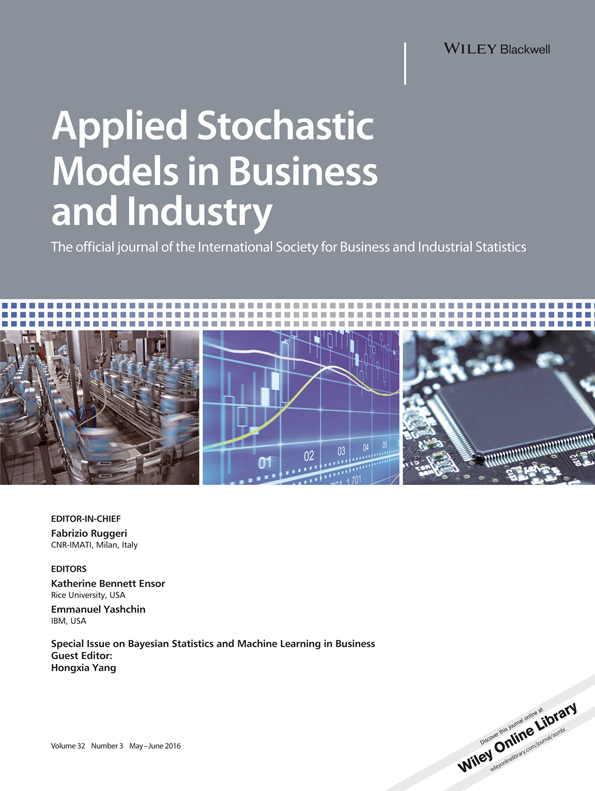A special issue on: Bayesian statistics and machine learning in business
This special issue of Applied Stochastic Models in Business and Industry consists of three invited papers by prominent Bayesian statistics and machine learning researchers around the world, which cover a broad range of topics and provide a wide perspective on the impactful roles of Bayesian statistics and machine learning in business. Each paper is accompanied by two discussions from leading researchers in direct related areas. They provide additional perspectives, directions to related work, and open areas, which help expand the scope of each topic. Authors of each paper also supply rejoinders to the discussants. The combination of paper, discussion, and rejoinder is aimed at providing the reader with a comprehensive exchange of thoughts and ideas.
One paper focuses on developing theoretical and computational insights to bear on problems involving large-scale data analysis that have immediate practical utility in financial data analyses and quite possibly in many other fields. Two other papers come from Yahoo! and Microsoft Research, leading institutes that have broad effects in industry. They focus on two important areas: computational advertisement and sponsored search. Both their papers show significant direct impacts in business using Bayesian statistics and machine learning methods.
- Dynamic Dependence Networks: Financial Time Series Forecasting & Portfolio Decisions by Zoey Zhao, Meng Xie and Mike West (Duke University), with discussions by Jonathan Hosking (Amazon Research) and Steve Scott (Google Research).
- Estimating Rates of Rare Events through a Multidimensional Dynamic Hierarchical Bayesian Framework by Hongxia Yang, Robert Ormandi, Han-Yun Tsao and Quan Lu (Yahoo! Inc), with discussions by Kuang-Chih Lee (Yahoo! Inc) and Liang Zhang (LinkedIn).
- Reinforcement Learning Behaviors in Sponsored Search by Wei Chen, Tie-Yan Liu, and Xinxin Yang (Microsoft Research), with discussions by Jingrui He (Arizona State University) and Yada Zhu (IBM Watson Research Center).
We open and close the special issue with papers on broad topics that showcase impactful use of Bayesian statistics and machine learning thinking for solving general domain problems, which position Bayesian statistics, machine learning, and researchers in these areas in leadership roles. In the first paper, Zhao et al. extended the dynamic dependence networks and the multiregression dynamic models, which provided an obvious path from univariate to multivariate time series modeling. This approach is wonderfully easy to be adapted to a wide variety of univariate time series models to handle multivariate problems. The authors illustrated the benefits of the approach in a dynamic portfolio allocation that consists of a 13-dimensional time series of daily prices (in $US) of several international currencies, commodities, and stock indices over a time span of 11 years. The paper by Yang et al. considered the problem of estimating occurrence rates of rare events for extremely sparse data using pre-existing hierarchies and selected features to perform inference along multiple dimensions in the field of computational advertisement. They demonstrated that on a real world leading ads campaign platform, their framework can effectively discriminate extremely rare events in terms of their click propensity. Finally, the paper by Chen et al. looked at the problem on employing reinforcement learning to model advertiser behaviors in sponsored search. Existing work on this topic assumes that the advertisers have the same way of optimizing their bid strategies, and Chen et al. viewed the sponsored search auctions as partially observable multi-agent system with private information where a reinforcement learning behavior model can be developed to better predict the bids the ranking positions of the advertisers in the near future.
This combination of methodological and application domains, alongside discussions on the role of researchers in Bayesian statistics and machine learning, serves to sketch the important roles of Bayesian statistics and machine learning in the context of various important areas, such as finance, computational advertisement, and search. We have seen big success of Bayesian statistics and machine learning in the big data era, and we expect more development in these two areas to prepare for the forthcoming artificial intelligence era.
We hope the Applied Stochastic Models in Business and Industry readers will find this mix interesting and thought provoking. We thank the authors, discussants, and reviewers for their timely and quality contributions that made this special issue possible. A big thanks to Dr. Fabrizio Ruggeri, who initiated the idea of this special issue and motivated us to put it together.




